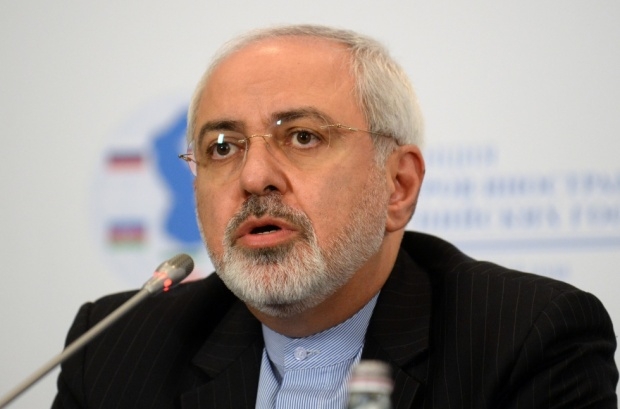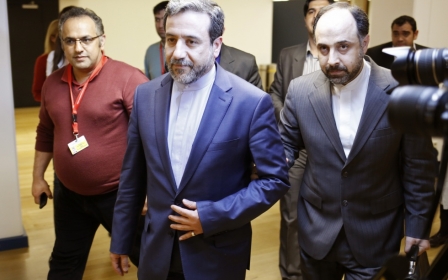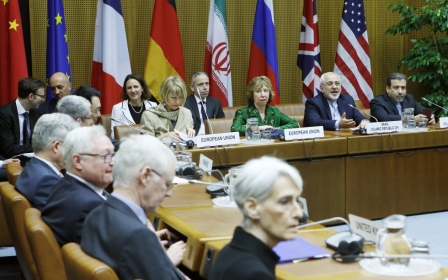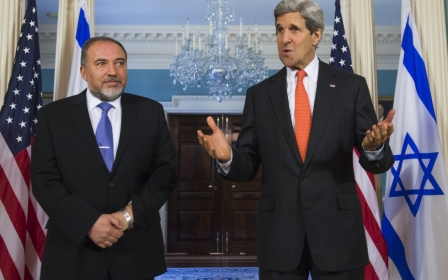Iranian FM says nuclear agreement is still possible

Iranian Foreign Minister Mohammad Javad Zarif said on Sunday that an agreement on Tehran's nuclear program was still possible, despite talks last week not resulting in a deal.
"Back from Vienna after tough discussions. Agreement is possible. But illusions need to go. Opportunity shouldn't be missed again like in 2005," he wrote on Twitter after meeting with representatives from the five UN Security Council countries and Germany.
The fourth round of negotiations between Iran and the P5+1 group of world powers aimed at reaching a permanent settlement to Tehran’s controversial nuclear program had ended on Friday with no signs of progress.
The US, Great Britain, France, China, Russia as well as Germany discussed uranium enrichment, nuclear cooperation, sanctions and the use of heavy-water reactors with Iran.
The parties want to clinch an accord by July 20, the expiration date of a November interim deal under which Iran froze certain activities in return for limited relief from crippling Western sanctions.
New MEE newsletter: Jerusalem Dispatch
Sign up to get the latest insights and analysis on Israel-Palestine, alongside Turkey Unpacked and other MEE newsletters
In return for further concessions, the Islamic republic, which denies seeking an atomic weapon, wants the lifting of all UN and Western sanctions, which have badly damaged its economy.
The latest round of talks with the P5+1 ended with both sides complaining major gaps remained ahead of the July deadline.
"Huge gaps remain, there is really more realism needed on the other side," a Western diplomat said. "We had expected a little more flexibility on their side."
A senior inspector from the UN atomic energy is due in Iran on Monday to discuss the issue.
The International Atomic Energy Agency's chief inspector Tero Verjonata and several other officials are to begin talks in Tehran on Tuesday.
The visit is aimed at "tackling the remaining concerns and clarifying some ambiguities," Iran's atomic agency spokesman told the ISNA news agency.
Optimism
On Sunday, Iran's English-language Press TV cited the country's deputy foreign minister, Abbas Araqchi, as saying that the next round of talks are to be held in Vienna on 16-20 June.
Araqchi emphasised to MPs that talks had not failed, state news agency IRNA quoted lawmaker Hojatollah Soori as saying.
"As we further go ahead with the negotiations, it gets tougher, but we hope to reach an agreement by 20 July," Araqchi said.
According to Soori, Araqchi also said it would be possible to hold informal meetings before the June talks.
Ali Akbar Velayati, foreign policy adviser to Iran's supreme leader Ayatollah Ali Khamenei, was also upbeat.
"There is hope for a positive outcome in the talks, as long as other parties show their goodwill like Iran," he said, quoted by reformist daily Sharq.
Saeed Laylaz, a leading Iranian political analyst, also expressed optimism.
It is normal for a dispute that surfaced a decade ago "not to be completely resolved in just a few months," he told Etemad newspaper.
"An agreement that is difficult to reach would be more sustainable than an easy one."
The failure of the latest round of talks was welcomed by hardliners in Iran, however.
Kayhan newspaper ran a headline saying the talks had "fortunately ended fruitless".
Its editorial criticised the West over the interim agreement it said deceived President Hassan Rouhani into accepting "too many concessions for too little gain".
Failure to reach an accord by 20 July could potentially spark a conflict over Iran's nuclear programme - and neither Israel nor Washington have ruled out military action.
Negotiators can in theory extend the limit,, but both US President Barack Obama and Rouhani could struggle to keep hardliners on their domestic fronts at bay.
Middle East Eye delivers independent and unrivalled coverage and analysis of the Middle East, North Africa and beyond. To learn more about republishing this content and the associated fees, please fill out this form. More about MEE can be found here.




